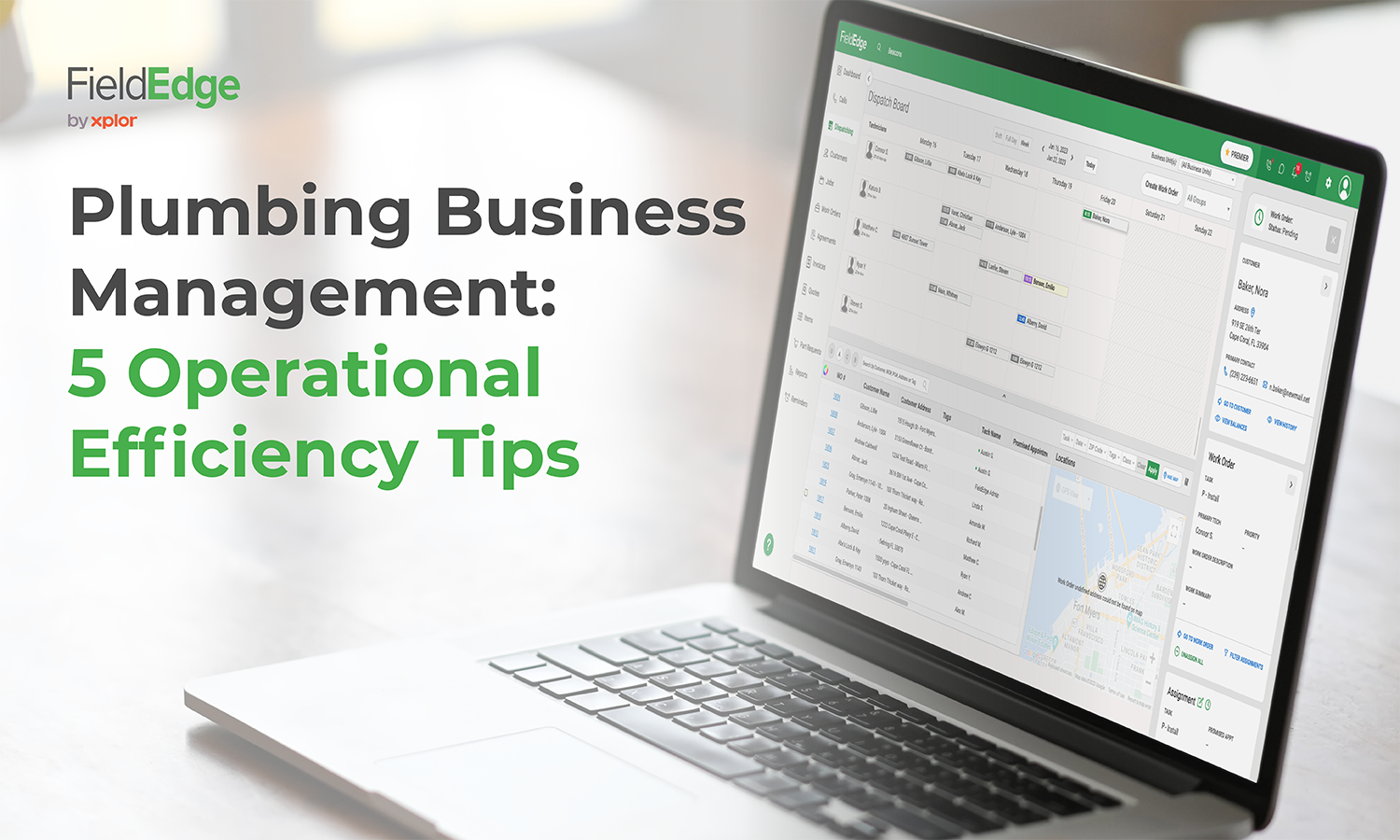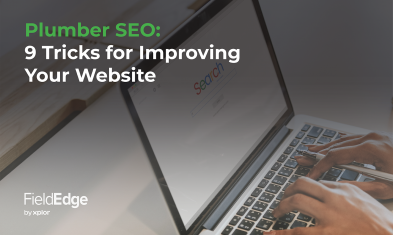Plumbing business management helps your business stand out in this competitive industry. However, plumbing business management is about more than cutting costs; it’s about optimizing every aspect of your business to improve productivity, reduce waste and enhance customer satisfaction.
Whether you’re running a small local operation or a larger plumbing business franchise, streamlining your processes can lead to significant improvements in profitability and growth.
In this article, we will discuss five actionable tips to help you achieve operational efficiency in your plumbing business. These tips cover everything from optimizing your scheduling and dispatching processes to leveraging the latest technology.
Additionally, we’ll look at the importance of employee training and development, as well as the role of Key Performance Indicators (i.e. KPIs) in driving continuous improvement.
This article will demonstrate how you can use these expert tips and strategies to:
- Improve your scheduling and dispatching system to maximize efficiency
- Utilize top-of-the-line software to streamline many of your processes
- Monitor performance indicators to continue to get even more efficient
1. Optimizing Scheduling and Dispatching
Efficient scheduling and dispatching are the backbone of streamlined plumbing business management. Poorly managed schedules can lead to delayed appointments, frustrated customers and underutilized plumbers—all of which negatively impact your bottom line.
Optimizing these processes ensures that your team is always in the right place at the right time, minimizing downtime and maximizing productivity.
The first step in optimizing scheduling and dispatching is to adopt a system that allows for real-time tracking and adjustments.
Use of Scheduling Software
Investing in advanced scheduling software is one of the most effective ways to streamline this process. Modern software solutions offer features such as:
- Drag-and-drop scheduling
- Automated reminders
- Route optimization
This ensures that your plumbers are dispatched to the right jobs in the most efficient manner possible. Real-time updates allow you to adjust schedules on the fly, accommodating last-minute changes or urgent requests without disrupting the entire day’s plan.
Benefits of Route Optimization
Route optimization is another critical aspect of efficient dispatching. By planning the most direct and least congested routes, you can reduce travel time and fuel costs, allowing your plumbers to complete more jobs in a day. This not only improves productivity but also enhances customer satisfaction by ensuring timely service.
Centralized Communication
Centralized communication tools are essential for keeping your office and field teams in sync. With everyone using the same platform, you can ensure that updates are communicated instantly, reducing the chances of missed appointments or miscommunications.
A unified communication system also allows your office staff to monitor job progress and provide accurate updates to customers, further enhancing the overall service experience.
2. Utilizing Technology for Field Service Management
Technology plays a critical role in modernizing and streamlining plumbing business operations. From job tracking to customer communication, investing in field service management software can automate various tasks, leading to improved efficiency and customer satisfaction.
Incorporating technology into your daily operations is no longer optional; it’s a necessity for staying competitive in the plumbing industry.
Field Service Management Software
Field service management (i.e. FSM) software is designed to help plumbing businesses manage their field operations more efficiently. These platforms typically offer a range of features, including job scheduling, dispatching, customer management, invoicing and reporting.
By consolidating these tasks into a single platform, FSM software reduces the administrative burden on your office staff and ensures that your field plumbers have all the information they need to complete their jobs effectively.
Mobile Access
Mobile access is another crucial component of modern FSM software. With mobile apps, your plumbers can access job details, update job statuses and even capture customer signatures on-site, all from their smartphones or tablets.
This not only improves efficiency but also enhances accuracy by reducing the need for manual data entry.
Customer Relationship Management (i.e. CRM)
Integrating your FSM software with a Customer Relationship Management (i.e. CRM) system can further enhance operational efficiency. CRM systems help you:
- Manage customer interactions
- Track service history
- Identify opportunities for upselling or cross-selling
By having a complete view of each customer’s history, your plumbers can provide more personalized service, leading to higher customer satisfaction and loyalty.
3. Training and Development for Employees
Continuous training and development are essential for maintaining a skilled and efficient workforce. By investing in your employees’ growth, you ensure they have the knowledge and skills to perform their tasks efficiently. This not only reduces errors but enhances overall productivity.
Investing in your employees is one of the most effective ways to boost operational efficiency and ensure long-term business success.
Ongoing Training Programs
Ongoing training programs are vital for keeping your team up-to-date with the latest industry standards, technologies and best practices.
Regular training sessions help your plumbers develop new skills, improve their existing ones and stay informed about the latest tools and techniques. This not only boosts their confidence and job satisfaction but also reduces the likelihood of costly mistakes.
Importance of Certifications
Encouraging your employees to pursue certifications in specialized areas of plumbing can also improve operational efficiency.
Certified plumbers are often more knowledgeable and capable of handling complex jobs, leading to quicker resolutions and higher customer satisfaction. Additionally, offering certification programs as part of your training initiatives can be a powerful incentive for attracting and retaining top talent.
Mentorship and Leadership Development
Mentorship programs and leadership development initiatives are other effective ways to invest in your team. By pairing experienced plumbers with newer employees, you create opportunities for knowledge sharing and skill development.
Also, leadership training programs can help identify and groom future leaders within your company, ensuring a smooth transition as your business grows.
By the way, did you know that FieldEdge has a Field Services Academy? This is a group where you can connect with fellow field service business entrepreneurs for industry tips, troubleshooting, and insights into scaling your business into a long-term success.
4. Monitoring Key Performance Indicators (i.e. KPIs)
Key performance indicators (i.e. KPIs) provide valuable insights into the performance of your business, allowing you to make informed decisions that drive operational efficiency.
Tracking and analyzing KPIs allows you to measure the efficiency of your operations. By regularly reviewing KPIs, you can identify areas for improvement and make data-driven decisions to optimize your business processes.
Selecting Relevant KPIs
Choosing the right KPIs to monitor is crucial for accurately assessing your business’ operational efficiency. Common KPIs for plumbing businesses include:
- Job completion rates
- Average response times
- Customer satisfaction scores
- Plumber productivity
By tracking these metrics, you can identify trends, pinpoint inefficiencies and implement corrective actions as needed.
Pro Tip! Easily track these KPIs (and MORE) using FieldEdge.
Regular Reporting
Establishing a regular reporting schedule is essential for keeping track of your KPIs and ensuring that everyone in your organization is aligned with your operational goals.
Weekly or monthly reports can provide a snapshot of your business’s performance, highlighting areas where you’re excelling and areas that need improvement. Sharing these reports with your team can also foster a culture of accountability and continuous improvement.
Using Data to Drive Improvement:
The ultimate goal of monitoring KPIs is to use the data to drive improvement. By analyzing your KPIs over time, you can identify patterns and correlations that may not be immediately apparent.
For example, if you notice a dip in customer satisfaction scores, you can investigate the root cause and take steps to address it. That may mean adjusting your scheduling practices, improving communication or offering additional training to your plumbers.
5. Enhancing Customer Communication and Experience
Operational efficiency isn’t just about internal processes—it’s also about how effectively you communicate with your customers and the quality of the service experience you provide. Enhancing customer communication can lead to better service outcomes, higher customer satisfaction and repeat business, all of which are crucial for a successful plumbing business.
Improving how you communicate with customers can streamline operations and boost customer satisfaction, which in turn can lead to more business and a stronger reputation.
Automated Communication Tools
One way to enhance communication is by using automated tools like SMS/texting and email notifications. These tools can be used to:
- Confirm appointments
- Provide updates on plumber arrival times
- Send follow-up surveys after a job is completed
By keeping customers informed at every stage of the service process, you can reduce the likelihood of missed appointments and improve overall satisfaction.
Personalized Customer Service
Investing in CRM systems can also help you provide more personalized customer service. By tracking customer history and preferences, you can tailor your communication to meet their specific needs.
For example, if a customer has previously had issues with a specific type of plumbing repair, your CRM system can flag this information, allowing your plumber to be better prepared for the job.
Customer Feedback and Continuous Improvement
Soliciting customer feedback after each job is another effective way to enhance communication and improve operational efficiency. Customer feedback can provide valuable insights into areas where your service might be lacking, allowing you to make necessary adjustments.
Additionally, acting on customer feedback shows that you value their input, which can strengthen customer loyalty and lead to more repeat business.
By focusing on enhancing customer communication and experience, you can not only improve operational efficiency but also create a more loyal customer base, leading to sustained growth and success for your plumbing business.
Want to save money and time? Schedule a personalized FieldEdge demo today!
Start Streamlining Plumbing Business Management Today!
Operational efficiency is the key to a successful plumbing business. By optimizing your plumbing business management processes, you can streamline your operations and set your business up for long-term success.
Here are a few key takeaways:
- Implement tools to optimize scheduling and dispatching.
- Utilize technology to automate and streamline tasks.
- Invest in ongoing training and development for your employees.
- Regularly monitor KPIs to identify and address inefficiencies.
- Improve customer communication with field service management software.
By focusing on these plumbing business management areas, you can enhance your business’ operational efficiency, improve customer satisfaction and position your company for sustained growth in the competitive plumbing industry.
Related: 4 Simple Steps to Boost Plumbing Leads and Clients




